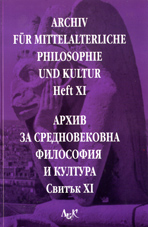Мотиви за началото на Кръстоносното движение по данни на съвременните извори
Reasons for the beginning of the crusades according to the contemporary sources
Author(s): Vesselina Vachkova, Vasil NinovSubject(s): Philosophy
Published by: Издателство »Изток-Запад«
Summary/Abstract: The present article, in difference of the most studies on this issue, is trying to emerge The Reason, identifying The Crusade as a Crusade. As a rule, a study like this is a little doubtful, because of the circumstance that there is a terminus technicus to be studied. The purpose of our work can be more pragmatic, and we hope that will be in accordance with the spirit of the examined age. We suggest being followed and presented various authentic inner impulses and outer motives (and from this basis to be brought into proper correlation religious pathos, prosaic utilitarianism, and bellicose enthusiasm), which had moved different groups of participants at the beginning of the Crusades. According to the sources of XIth and XIIth centuries, we can draw a conclusion that not only on different stages of preparation and march of the First Crusade, but even among the different participants in the movement, reasons for taking on the route to the East had been extremely different. Of course, there can be pointed general dominant themes. On the first place we must emphasize on the feeling that the world in which Christians live is one mundus senescens, and that the day of Second Advent is coming, and that then will be the Last Battle at the End of Times. This battle is prophesized to be done in the East - at the Armageddon. Closely connected with this reason is the thirst for self-cleanness (catharsis). It is possible to be achieved through the reliable tradition of pilgrimage to the Holy Land, but also through the promised by pope Urban II remissions of sins for the participants in the march to the East. On the one hand, the high-minded impulse to help Eastern Christian brothers is thought as a part of the catharsis. On the other hand, however, catharsis is connected with anti-Jewish and many others outrages and massacres, which had marked the pilgrims' route and had given to the Crusade a nature of a demonstrative exorcizing action. Meanwhile from the very beginning, the difference between the ideas of Rome and of pilgrims had being risen. Pope, fully in spirit of Cluniac reforms and Treuga Dei movement, probably had aimed to create an army to defense the apostolic throne. On the other hand, one part of the crusaders had seen the route through the Constantinople to Jerusalem not as the mystical pilgrimage (her Hierosofymitanum), but as something like a national duty of the franks - to walk on the mythical way of their emperor-saint Charlemagne (Iter Caroli Magni). For another part, movement to the East is just a colonizing act and so on. Irrespective of different motivations, there is one general reason for the participants in the first stage of the Crusading movement, which in consequence had turned out to be very important for the development of the whole West. This is the belief that God had summoned - in the persons of the western pilgrims - his new Chosen People and that every best thing - belief, piety, and Christian power... belong to the West...
Journal: Архив за средновековна философия и култура
- Issue Year: 2005
- Issue No: 11
- Page Range: 89-121
- Page Count: 33
- Language: Bulgarian
- Content File-PDF

